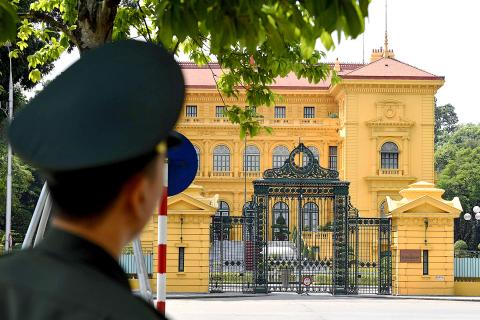Vietnamese President Tran Dai Quang yesterday died at age 61 after a prolonged and serious illness, state media reported.
He passed away from a “serious illness despite devoted treatment by professors and doctors” in Vietnam and abroad, the official Vietnam News Agency said.
In office as president since April 2016 after more than four decades at the powerful Ministry of Public Security, Quang had a reputation as a tough leader with little tolerance for dissent.

Photo: AFP
Although he held one of the nation’s top four positions and was officially the head of state, his role as president was seen as largely ceremonial, greeting visiting leaders and hosting diplomatic events in a bid to boost Vietnam’s profile on the world stage.
Quang had appeared thin and pale in public, and was unstable on his feet last week when he hosted a welcoming ceremony for Indonesian President Joko Widodo in the Vietnamese capital, Hanoi.
His last public appearance was just two days ago, at a meeting with visiting Chinese politicians and foreign dignitaries in Hanoi.

Photo: AP
Quang, a member of the Politburo, had a reputation as tough and influential in the inner circles of the communist party, though often appeared uncomfortable in the public eye and lacked the charisma of some of his peers in the upper echelons of the party.
In an interview with Agence France-Presse in 2016 ahead of a visit by then-French president Francois Hollande, Quang read from a prepared statement and was quickly escorted from the room by staff when a question went off-script.
State media made a somber announcement of his death and celebrated his long commitment to public service.
His time in office was dominated by a simmering conflict with Beijing over the South China Sea, a long-running dispute between the communist neighbours that escalated on several occasions.
Vietnam canceled at least one oil drilling project in the resource-rich region during Quang’s tenure in an apparent bid to quell tensions.
He was the administration’s most public face at a series of high-profile events, most notably at an APEC meeting in Danang in November last year where he hosted a bevy of world leaders — including US President Donald Trump and Chinese President Xi Jinping (習近平).
As president, he oversaw a crackdown on dissidents that rights groups have decried as a chokehold on free expression. More than 40 people were jailed this year and about 100 were behind bars as of April, according to Amnesty International.

NO EXCUSES: Marcos said his administration was acting on voters’ demands, but an academic said the move was emotionally motivated after a poor midterm showing Philippine President Ferdinand Marcos Jr yesterday sought the resignation of all his Cabinet secretaries, in a move seen as an attempt to reset the political agenda and assert his authority over the second half of his single six-year term. The order came after the president’s allies failed to win a majority of Senate seats contested in the 12 polls on Monday last week, leaving Marcos facing a divided political and legislative landscape that could thwart his attempts to have an ally succeed him in 2028. “He’s talking to the people, trying to salvage whatever political capital he has left. I think it’s

Polish presidential candidates offered different visions of Poland and its relations with Ukraine in a televised debate ahead of next week’s run-off, which remains on a knife-edge. During a head-to-head debate lasting two hours, centrist Warsaw Mayor Rafal Trzaskowski, from Polish Prime Minister Donald Tusk’s governing pro-European coalition, faced the Eurosceptic historian Karol Nawrocki, backed by the right-wing populist Law and Justice party (PiS). The two candidates, who qualified for the second round after coming in the top two places in the first vote on Sunday last week, clashed over Poland’s relations with Ukraine, EU policy and the track records of their

UNSCHEDULED VISIT: ‘It’s a very bulky new neighbor, but it will soon go away,’ said Johan Helberg of the 135m container ship that run aground near his house A man in Norway awoke early on Thursday to discover a huge container ship had run aground a stone’s throw from his fjord-side house — and he had slept through the commotion. For an as-yet unknown reason, the 135m NCL Salten sailed up onto shore just meters from Johan Helberg’s house in a fjord near Trondheim in central Norway. Helberg only discovered the unexpected visitor when a panicked neighbor who had rung his doorbell repeatedly to no avail gave up and called him on the phone. “The doorbell rang at a time of day when I don’t like to open,” Helberg told television

‘A THREAT’: Guyanese President Irfan Ali called on Venezuela to follow international court rulings over the region, whose border Guyana says was ratified back in 1899 Misael Zapara said he would vote in Venezuela’s first elections yesterday for the territory of Essequibo, despite living more than 100km away from the oil-rich Guyana-administered region. Both countries lay claim to Essequibo, which makes up two-thirds of Guyana’s territory and is home to 125,000 of its 800,000 citizens. Guyana has administered the region for decades. The centuries-old dispute has intensified since ExxonMobil discovered massive offshore oil deposits a decade ago, giving Guyana the largest crude oil reserves per capita in the world. Venezuela would elect a governor, eight National Assembly deputies and regional councilors in a newly created constituency for the 160,000